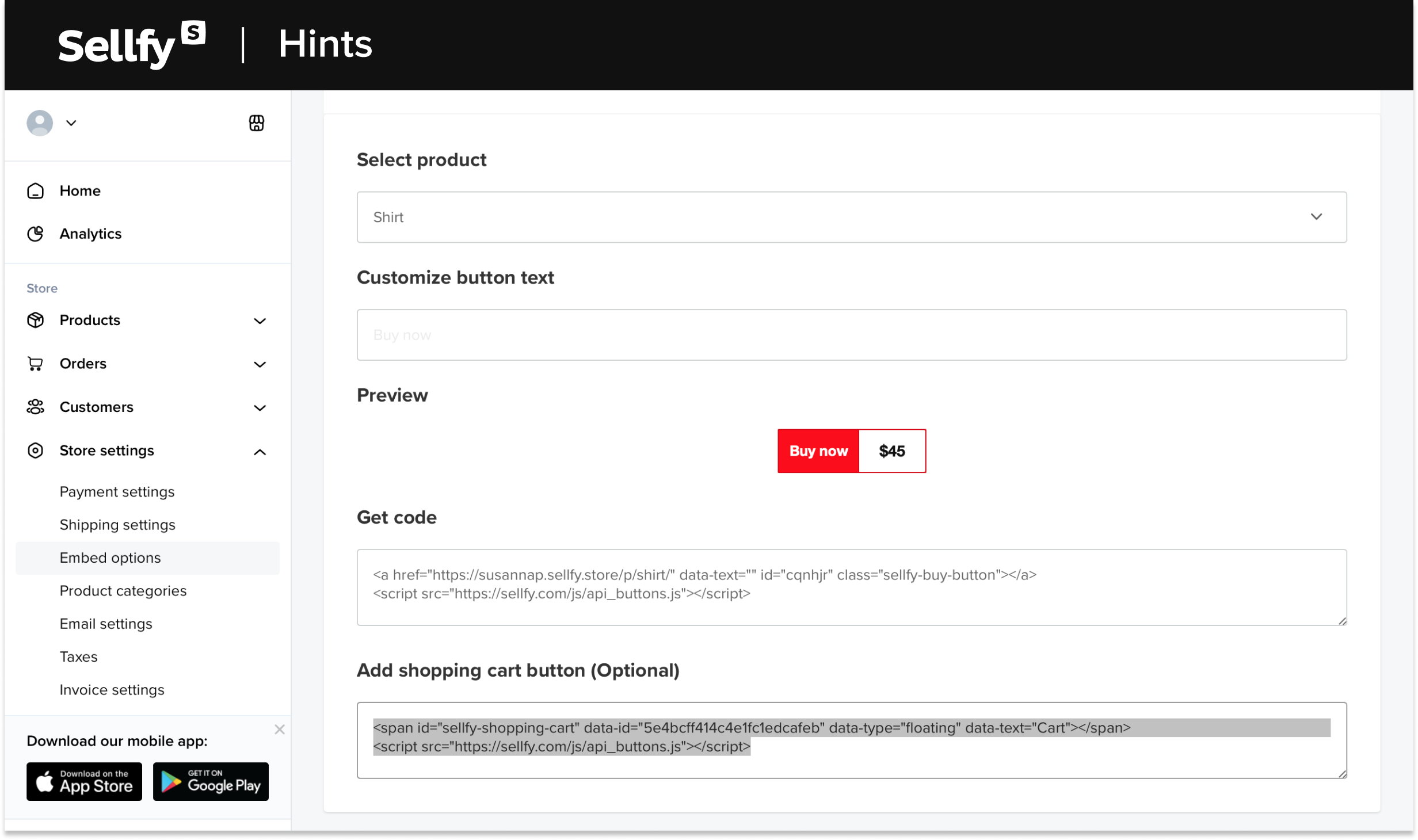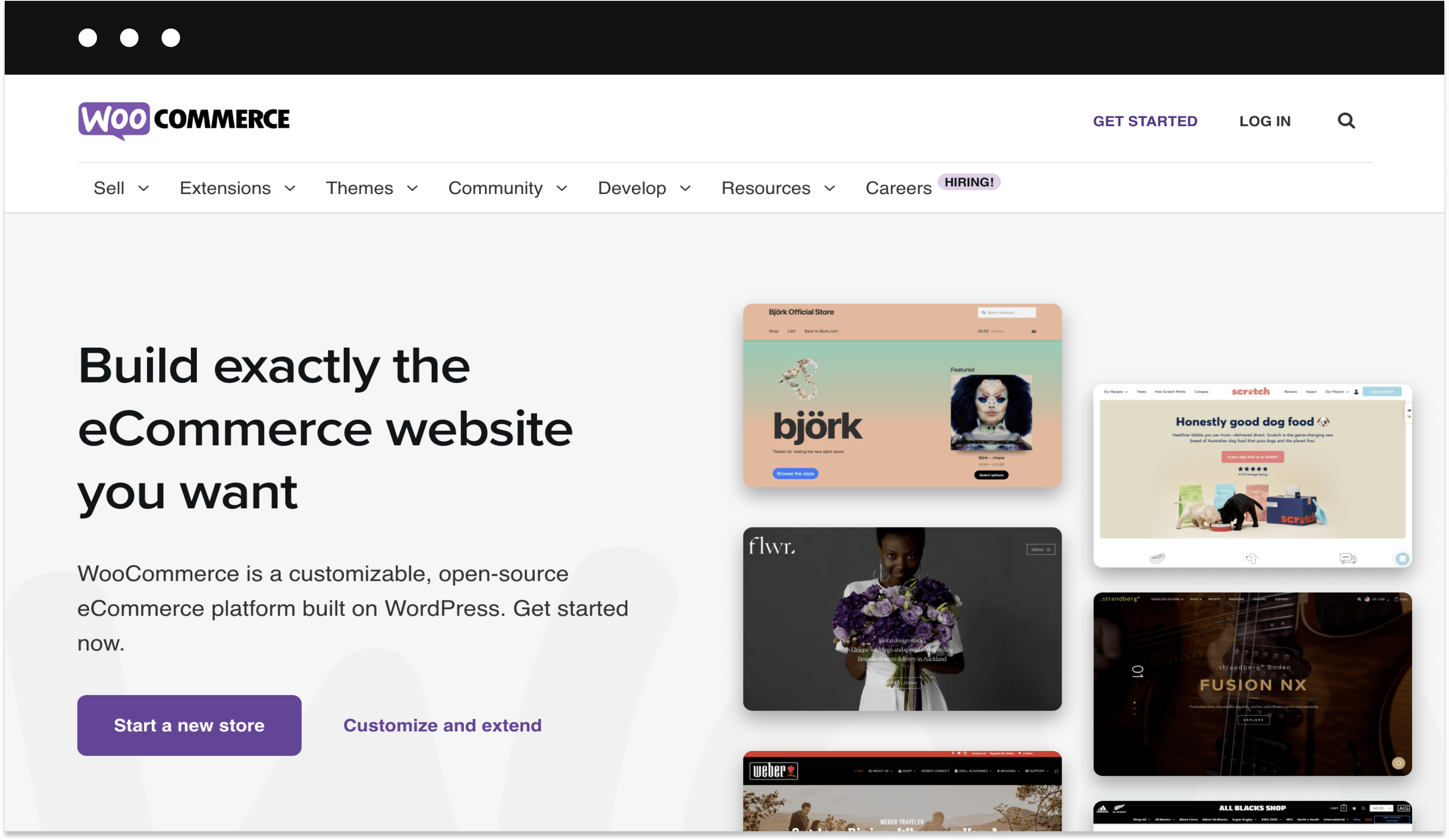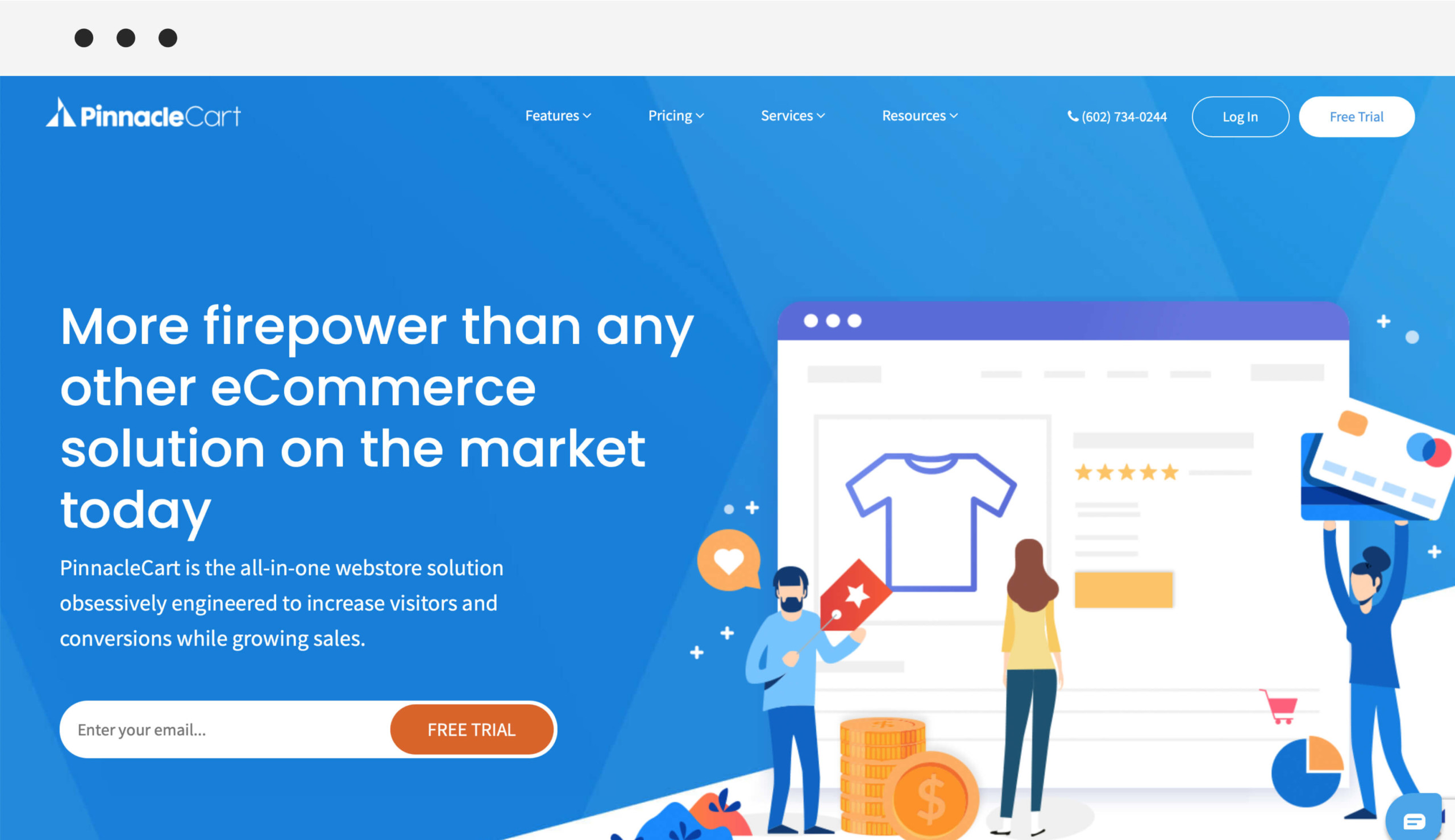12 best shopping carts for WordPress in 2026

If you want to turn your WordPress site into an eCommerce site, then you probably know that WordPress alone isn’t enough.
But don’t fret! With the right software, WordPress can become a professional-looking storefront. To get there, you’ll want a shopping cart. This type of software and its themes define how the storefront looks, what the user experience is, and how effortless the final steps of the checkout are — all of which can make the difference between having and not having that sale.
The majority of shopping carts out there are of the “SaaS” type (software as a service that requires a monthly subscription), but some are permanently-licensed ones. Generally, you’ll want to choose the SaaS type because it’s the best in terms of features, support, and updates, especially if you’ve got (or want to have) an online, high-volume shop. So, which shopping cart service should you choose then?
We made you a list of 11 best shopping carts to use in 2022 to make it easy for you to find the perfect one.
1. Sellfy – easiest & best setup for selling digital products
Sellfy sets itself apart from the rest of the shopping cart services on this list because it’s more than just a service—it’s an affordable e-commerce platform that is designed specifically to be easy to use for content creators who sell directly to their audience. Moreover, it’s not a plugin or a shopping theme, and it has some advanced features for physical and digital products like advanced security, subscriptions, large file hosting (even video streaming!). Best of all, there are no transaction fees.
For this reason, you don’t need to download files or do any sort of installation to make it work for your WordPress website unlike the other solutions on this list.
Sellfy’s shopping cart is a simple, customizable widget: you have just a simple code snippet that you copy and paste into your WordPress page or post. That’s it. And you have the option of deciding whether you want it next to every product as a static cart or as a floating one that follows you around the site. In combination with the cart, you can embed a “buy now” button wherever you want on your WordPress website for faster checkout. Lastly, there’s the option to embed a product card or a whole store view without having the user leave your site.
With Sellfy’s shopping cart, you can focus more on content creation and less on setting up your website.

Pros
- Easy to set up
- Embeddable shopping tools for WordPress
- Good customizability
- Excellent security
- A dedicated mobile app
- Internal marketing via email, upselling, and discounts
- App integrations like Zapier and Patreon
- Analytics tools
- Easy product management
Cons
- No free version after the free trial
- No multi-channel marketing or promotional services
- No reviews management
- Lacking in payment gateways (only Stripe and Paypal)
2. WooCommerce – best for DIY WordPress websites
No list is complete without WooCommerce. WooCommerce is well known for being the e-commerce toolkit built for none other than WordPress itself. It’s a free open-source software that covers all imaginable aspects of e-commerce, and it can meet even the most complex of all needs. But because it’s relatively bare without extensions that are paid for, taking full advantage of everything it offers requires a considerable amount of resources.

Pros
- Completely customizable and fully open source
- Reviews management
- Intuitive storefront (once past the learning curve)
- A very large number of extensions
- Can take many different forms of payment
- Works well with any store, no matter the needs
- Extremely well documented
- Multiple integrations with third-party software
- Great digital download security
Cons
- An overwhelming number of options
- Takes time to learn this complex system
- All software related updates and maintenance is on you
- Using multiple paid extensions can make the store prohibitively expensive to run
3. Shopify – most common option with PoS & least expensive for existing sites
Shopify is one of the most popular shopping cart options out there because of its heavy advertising and, for the most part, rave reviews. Besides the fact that Shopify offers hosting, there’s something else about it that makes it valuable to the WordPress-using store owner: its Lite plan.
If you’re a one-man shop or a small-scale WordPress site owner and all you want is to have an embeddable shopping cart that can do lists, catalogs, and categories, Shopify’s Lite plan, and its price may be what you need—just keep in mind its limitations.

Pros
- Lite plan is just $9 a month and comes with a “Buy now” button
- Can integrate with dropshipping services and other apps.
- Has an invoice-creation feature
- Comes with a shopping cart for multi-item checkout
- Easy to manage and embed products in WordPress
- Good support
- Unlimited products, bandwidth, and storage
Cons
- No free version, only a free trial
- The less you pay per plan, the higher the transaction fees
- There are transaction fees if not using Shopify’s own payment gateway
- Sales reports are unavailable in the lower pricing plans
- Limited customization
- Limited number of staff users per plan
4. BigCommerce WordPress Plugin – good for medium-sized stores wanting flexibility
The combination of BigCommerce and WordPress works well because the e-commerce part is handled entirely by BigCommerce itself. BigCommerce has hosted shopping cart software that really shines with its simple-to-use interface and easy store management. Because BigCommerce is geared towards providing the best user experience and an easy checkout process, you can focus on other aspects of your WordPress site. This makes BigCommerce especially ideal for new stores.

Pros
- Good for multiple site management
- Free 15-day trial
- Product creation is simple
- Has a native plugin that won’t slow down your site
- Smooth checkout process
- No transaction fees
- Multiple sales channels
- Integration with shipping providers for more money savings
Cons
- Themes are expensive
- Higher monthly costs for stores that grow in revenue above a tier’s cap
- There is no “Lite” version (lowest pricing plan incl. hosting is $29.99/mo)
5. 3DCart
3DCart has pretty much everything you’d want from a place-anywhere buy button to point of sale to enterprise e-commerce, although it must be noted that it can be a more expensive solution depending on what you need. One thing that it does arguably better than some competitors is mobile optimization—everything loads fast and looks great on mobile devices because of its editable code. And, like other shopping carts, this one can scale to any size, making it a viable one-stop solution if you decide to start with it.
Pros
- Has a good number of third-party integrations
- Optimized for mobile
- Many designs to choose from
- Handles returns well
- Has one of the largest payment gateway selections ever
- Can be used for dropshipping
- Unlimited products and storage
- Marketing & SEO features
- Good support
Cons
- Limited number of staff accounts per plan
- Feature-rich but only on the higher-priced plans
- Limited number of free templates
- Not the most intuitive shopping cart for new users
- Add-ons can get expensive
6. PrestaShop – perfect for large online stores with developer resources
PrestaShop sets itself apart from the rest because it’s completely free shopping cart software that’s also open source (anyone can change its code at will), and it comes with some advanced features that you’ll only find in the upper tiers of other shopping carts’ pricing plans. For example, PrestaShop comes with automated engagement and cart abandonment recovery emails. Another nice feature is having the ability to manage customer accounts and being able to customize the forms to make the experience better.
Of course, it’s good to keep in mind that what doesn’t cost anything still has a price: if you’re not HTML and PHP savvy, you may need to hire someone to help you combine WordPress and PrestaShop into an amazing store.

Pros
- Comes with some great marketing and analysis tools
- Has legal advice for international shops
- Works well with mobile devices
- Wide range of themes
- Large community of users for support
- Hundreds of third-party add-ons for purchase
- Store error messages are sent via email
- Great for developers who know what they’re doing
Cons
- No web hosting
- Since it’s not a software-as-a-service shopping cart, you must do all the work
- May get technical and require coding knowledge
7. ShopperPress – for stores on a budget
ShopperPress is an interesting and unique cart that’s actually a shopping cart theme for the entire site rather than being an embeddable SaaS type of cart. That means that it requires only a one-time payment instead of recurring ones from month to month, and it can be installed on an unlimited number of websites. The beauty of this plugin is that because it works natively with WordPress, it allows you to create a custom type of post specifically for a product. While it does have the most standard features of shopping cart software, you’d need to use plugins if you want more from it, since there are no upgrades.
Pros
- Costs less than $100 and is a one-time purchase
- Unlimited website installations
- Fully customizable
- Lifetime support & updates
- Takes only 5 minutes to set up
- Works with WordPress’ plugins/add-ons well
- Responsive & mobile-ready
- 20+ payment gateways
Cons
- Some child themes (themes that further customize the layout) may have bugs depending on your setup
- Larger stores may find ShopperPress to be lacking
- Despite the lifetime support, your mileage may vary with how helpful it is
8. Tribulant’s Shopping Cart
Tribulant’s WordPress plugin is an excellent choice for those who want something that simply converts their WordPress site into an online store without fuss or hassle. If “you get what you pay for” is to be applied here, then we can say that this shopping cart plugin bridges the gap between free and paid.
So, while it may not be the most feature-loaded out there, the fact that it’s a one-time purchase makes it an economical option.
Pros
- Multiple shipping provider service integrations
- Multilingual (with a plugin)
- Many payment method options (incl. Custom ones)
- Secure — all payment and shipping information is encrypted
- Allows users to leave reviews (similar to Amazon)
- Good customization
- SEO features via a plugin
- Easy installation
Cons
- No free trial or free version
- Support is not as good as some of the SaaS type of shopping carts’
- Updates are free for the first year
- Can only have one base currency (everything else is treated as a currency conversion)
- No multi-site management
9. 10Web
10Web is a multi-service shopping cart provider not too different from other e-commerce solutions. But why anyone would choose 10Web is that it’s specifically for mass/volume e-commerce, allowing multiple sites to be connected to one plan. Furthermore, it comes with over 50+ premium WordPress plugins (including a free shopping cart), making it a convenient solution for any WordPress store in general.
Pros
- Affordable pricing and WordPress website hosting
- Has a unified control panel to manage multiple sites
- Fast support response time (email/chat)
- All pricing plans have (mostly) the same features
- Features image optimization to load your site faster
- High-class security
- Elementor-based site builder for WordPress
- Free SSL certificates
Cons
- Going over allotted storage/visits/backup space per plan incurs a monthly charge
- No support by phone
10. WordPress eCommerce
WordPress was designed originally to be for blog publishing, not an e-commerce platform, but because of the popularity of building various sites with it, WordPress itself has an option to turn any site into a store. However, there’s a catch: you must be in Canada or the U.S., be on a Business plan, and have previously used a custom theme or plugin. This is great for starters, but more serious stores may want to look elsewhere.

Pros
- It’s officially from WordPress
- Plenty of plugins
- Plenty of themes
- Native customization
- Site hosting
- For business plan and above, unlimited bandwidth and 200GB of storage
- Analytics tools
Cons
- No access to the server space of your site’s files
- Alone, it lacks many features compared to those of SaaS shopping carts
- Not the best security available
- Unless starting with the top tier, it’s PayPal all the way
- Billed annually only
11. X-Cart
X-Cart is a professional solution that integrates with WordPress, provided that you have the technical expertise to make it work side by side. Alternatively, WordPress can be integrated into X-Cart with products and buy buttons (requires less technical knowledge).
There are two versions of X-Cart: SaaS (the hosted version) and self-hosted (a one-time licensing fee for the DIY people). As such, it requires manual setup and coding skills, but on the plus side, WordPress can be managed from within X-Cart. In the long-run, this can be a cost-effective option for large WordPress website stores that want to do everything themselves.
Pros
- There’s a free version and a trial of its hosted version
- One-time licensing cost for bigger businesses
- A hosted option for those who prefer SaaS
- Developer-friendly
- Over 120 payment gateways by default
- Code access makes it limitlessly customizable
Cons
- The hosted version is expensive compared to other hosted services
- Small- / medium-sized stores may find it too advanced
- Coding knowledge is necessary to take advantage of everything
12. PinnacleCart – great for enterprises looking for a professional look
Pinnacle Cart is one of the oldest shopping carts that focuses on professional and enterprise-level online stores that don’t have complex needs. As a result, not only does PinnacleCart have some of the best security available for such a cart but also developers to help you build your WordPress website for you. However, this focus means that its standard plan is pricey for the amount of bandwidth and storage it offers, and you may want to look elsewhere if you’re not established.

Pros
- Excellent support
- Free data migration to PinnacleCart (in most cases)
- No transaction fees
- Multi-channel marketing tools
- 14-day free trial
- A good number of payment gateways
- Intuitive UI
- Multiple admin accounts
Cons
- The focus appears to be on enterprise-level online stores
- Standard plan skimps on bandwidth and disk space
- More complex store needs may not be met
- Limited themes compared to those offered by competitors






